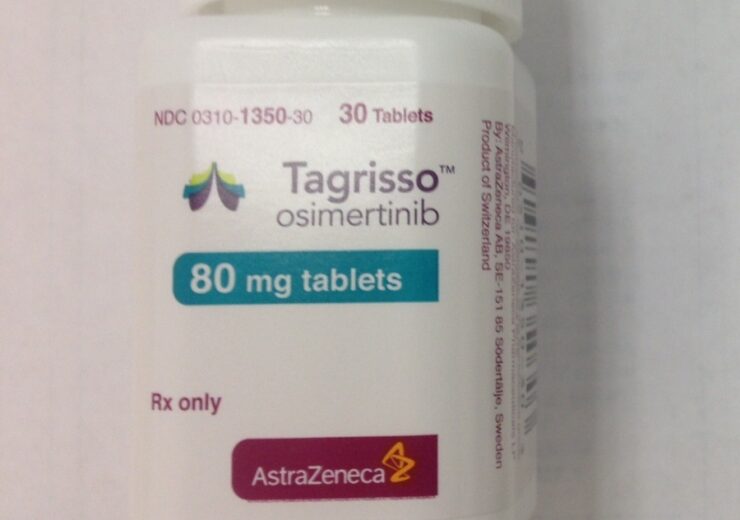The late-stage trial compared the lung cancer drug with placebo in the late-stage trial in 682 patients having early-stage EGFR-mutated NSCLC

Product image of AstraZeneca’s lung cancer drug Tagrisso. (Credit: AstraZeneca)
AstraZeneca said that Tagrisso (osimertinib) has met a key secondary endpoint in the ADAURA phase 3 trial by delivering a statistically significant and clinically meaningful improvement in overall survival (OS) in patients with a type of non-small cell lung cancer (NSCLC) in the adjuvant setting.
Tagrisso is an irreversible epidermal growth factor receptor (EGFR) tyrosine kinase inhibitor (TKI). It was compared to placebo in the late-stage trial in 682 patients having early-stage EGFR-mutated NSCLC.
The participating patients had previously undergone full tumour resection with curative intent.
In 2020, AstraZeneca stated that Tagrisso showed a statistically significant and clinically meaningful improvement in disease-free survival (DFS) in the adjuvant setting. Later, in September 2022, the company released updated results, which showed a median DFS of around five and a half years.
The primary endpoint of the ADAURA trial was DFS in Stage II and IIIA patients. The key secondary endpoints included DFS in Stage IB, II, and IIIA patients, and OS in the primary as well as overall populations.
ADAURA trial principal investigator Roy Herbst said: “These new survival data for osimertinib reinforce the unprecedented ADAURA disease-free survival results and confirm its potential to extend patients’ lives in early-stage disease.
“The ADAURA results provide powerful evidence that osimertinib offers the best possible care for patients with early-stage EGFR-mutated non-small cell lung cancer who historically faced high rates of recurrence and previously had no targeted options after surgery.”
Tagrisso has approval in the US, European Union (EU), and other countries for the treatment of early-stage lung cancer.
Besides, the drug is indicated as a first line treatment for patients having locally advanced or metastatic EGFRm NSCLC and for the treatment of EGFR T790M mutation-positive NSCLC that is locally advanced or metastatic in the US, EU, Japan, China, and other countries.
AstraZeneca oncology R&D executive vice president Susan Galbraith said: “The ADAURA trial brought the first targeted medicine to patients with early-stage EGFR-mutated non-small cell lung cancer.
“Today, these exciting overall survival results validate adjuvant Tagrisso as the standard of care in this setting and reinforce the importance of early diagnosis and testing for EGFR mutation in lung cancer.”
Separately, AstraZeneca said that Imfinzi-based treatment before and after surgery in patients with resectable early-stage NSCLC in the AEGEAN phase 3 trial significantly increased the time patients survive without recurrence or progression events.
